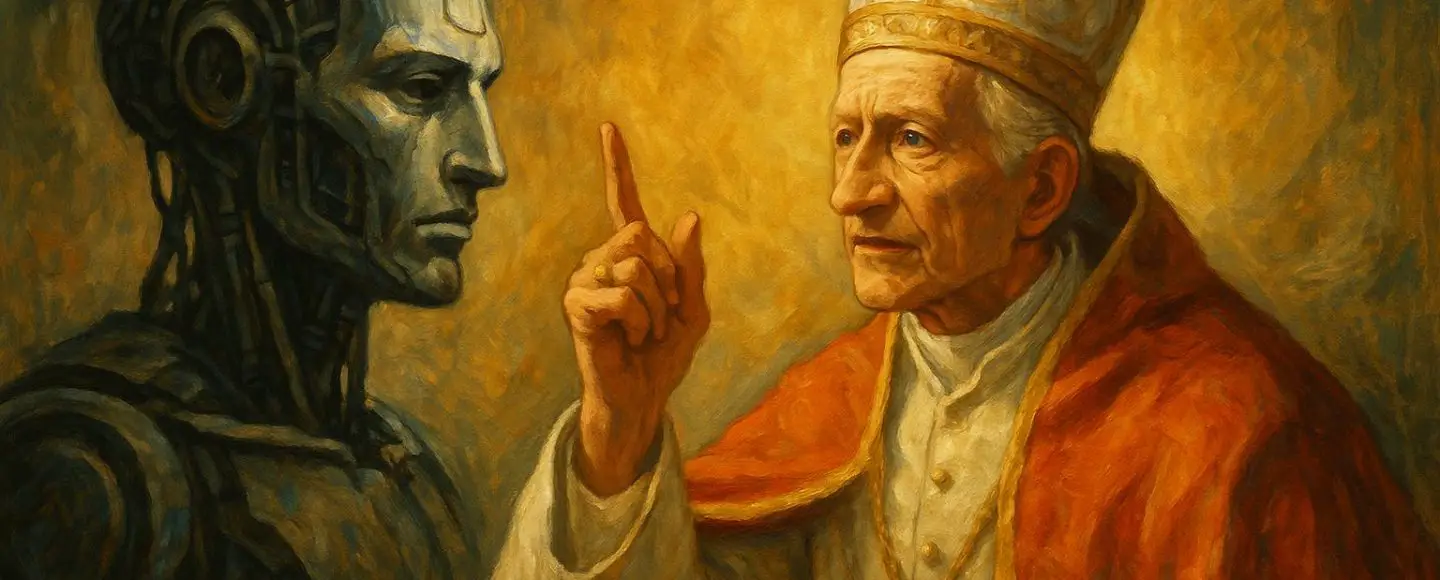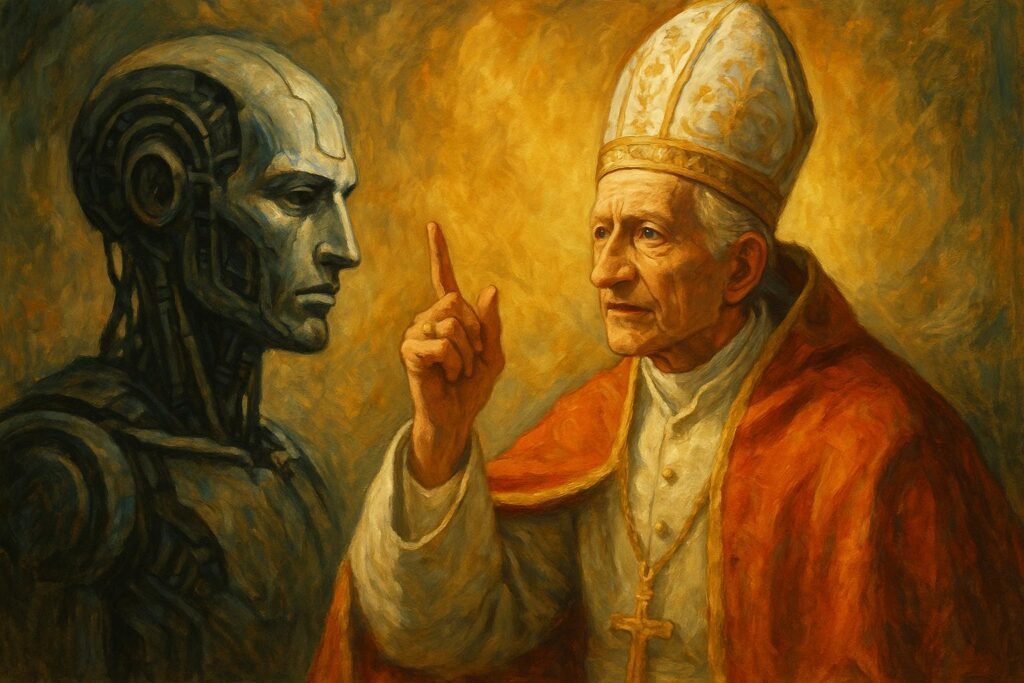
Pope Leo Declares AI a Moral Crisis
Pope Leo Declares AI a Moral Crisis, warning that unregulated artificial intelligence poses serious threats to human dignity, labor justice, and ethical coexistence. In a landmark address at the Vatican, Pope Leo called on world leaders, religious authorities, and technology companies to unite under a globally-aligned ethical framework for responsible AI development. His call marks a profound movement in the Catholic Church’s longstanding engagement with emerging technologies, expanding its moral doctrine into the digital age with an unwavering commitment to protecting the human condition from technological exploitation.
Key Takeaways
- Pope Leo framed artificial intelligence as both a moral and spiritual crisis requiring urgent governance.
- The Vatican is initiating plans to support a global ethics consortium centered on human-centered AI development.
- The Church insists on values-based AI policies that prioritize dignity, transparency, and social cohesion.
- This marks the Vatican’s most extensive intervention in global technological policy to date.
Papal Address: A Moral Call to Action
During a carefully-worded keynote speech at the Vatican’s annual Digital Ethics Summit, Pope Leo expressed grave concern over the accelerating development of artificial intelligence without corresponding ethical oversight. He named AI not merely a technological concern, but a “moral frontier,” pressing global powers to treat it as an issue of conscience and human worth. Issues such as economic displacement, social fragmentation, and cognitive manipulation rank among AI’s most pressing dangers. The Pontiff challenged humanity to build moral “guardrails” before technical capabilities advance beyond ethical safeguards.
The Church’s Expanding Role in AI Governance
Pope Leo’s address reflects the Catholic Church’s deepening engagement with technological questions. Over the past decade, the Vatican has hosted symposiums, forged research alliances with tech firms, and endorsed frameworks such as the Rome Call for AI Ethics. These efforts position the Church as a major advocate for human-centered AI. Catholic thought contributes fundamental principles like human dignity, solidarity, subsidiarity, and the common good. Pope Leo’s message extends this commitment by asserting spiritual leadership in one of today’s greatest ethical challenges.
What Is the Rome Call for AI Ethics?
Launched in 2020, the Rome Call for AI Ethics is a joint declaration signed by religious leaders, tech companies, and academic institutions. Its principles include transparency, inclusion, responsibility, impartiality, reliability, and security. Co-signed by IBM, Microsoft, and the Pontifical Academy for Life, the Rome Call encourages global cooperation in creating ethical AI. While many support it, implementation has remained limited. In response, the Vatican renewed momentum through Pope Leo’s address.
Risks the Pope Identifies: Human Labor, Dignity, and Truth
Among Pope Leo’s key concerns is the erosion of human agency and identity. He warned that unregulated AI could transform workers into “functionless instruments,” removing jobs without providing sustainable alternatives. Beyond economics, Pope Leo emphasized how generative AI might distort truth, weaken empathy, and degrade trust in relationships. Ethical development must serve humanity, not subordinate it. Respect for life, conscience, and justice should guide algorithms just as clearly as technical standards.
This view is shared by technology critics and philosophers. Some raise alarms regarding the ethical dilemmas and risks posed by advanced AI systems. Disregarding human values in favor of unbridled innovation places society at risk of serious harm.
Expert Perspectives on AI and Moral Responsibility
Professor Anna Delvecchio, theologian at Georgetown University, reflected on the Pope’s message: “This is not just a doctrinal concern, but a pastoral imperative. AI affects marriage, work, education, and illness. Pope Leo is inviting policymakers to see the soul inside the code.” Civil ethicist Dr. Liam Park added, “What distinguishes the Vatican’s approach is not merely a call for safety, but a call for meaning. That shifts the entire conversation around AI policy.”
Global Collaboration: The Vatican’s Next Move
Following the speech, Vatican officials signaled plans to form or endorse a global ethics consortium designed to produce enforceable ethical guidelines for AI. Bringing together religious leaders, tech entrepreneurs, and civic thinkers, the Church seeks to promote pluralism while safeguarding universal rights. This initiative could shape international negotiations related to AI law. The Vatican’s contributions may also influence efforts like the development of global AI legislation.
Analysis: How the Church’s AI Position Compares Globally
- United Nations: The UN promotes AI for development and digital equity. The Vatican enriches that view with a focus on human dignity and moral responsibility.
- European Union AI Act: The EU framework uses technical categories to assess risk. In contrast, the Church evaluates AI through moral priorities.
- OpenAI and Tech Industry: While tech firms emphasize safety and economic efficiency, the Vatican emphasizes spiritual values and social good over profit-driven logic.
Historical Context: Church Involvement in Technology
The Vatican’s interest in influencing technological progress has deep roots. The Church has responded to past innovations, including the printing press and genetic science, with careful evaluation. Pope Pius XII reflected on biology through a moral lens. Pope John Paul II urged ethical use of biotechnology. Pope Benedict XVI and Pope Francis spoke on digital media and surveillance. Pope Leo continues that legacy with renewed focus on artificial intelligence and its moral dimensions.
From historical precedent to recent developments, concern over the ethical implications of advanced AI has led to global soul-searching. With growing public awareness, the Church’s leadership reminds the world that values and conscience must shape technical innovation.
Timeline: The Vatican’s Involvement in AI Ethics (2019–Present)
- 2019: Vatican hosts “The Common Good in the Digital Age” conference.
- 2020: Release of the Rome Call for AI Ethics signed by Microsoft and IBM.
- 2021: Vatican partners with universities to research machine bias.
- 2022: Vatican Academy for Life expands AI ethics committee.
- 2023: Pope Leo initiates multi-faith consultation on digital dignity.
- 2024: Papal address declares AI a global moral crisis, proposing a values-centered intergovernmental consortium.
How Concerned Citizens and Leaders Can Respond
Though Papal addresses often have doctrinal weight, this message doubles as a call to global action. Citizens are encouraged to:
- Contact lawmakers to advocate for AI policies that protect human dignity and fairness.
- Engage with local institutions, including schools, churches, and civil groups, on how AI affects family and community life.
- Support initiatives that promote ethical research, such as those addressing AI and its ethical responsibilities.
Governments, institutions, and businesses alike should include moral scholars in AI discussions, not just technical advisors. Companies are urged to implement value-based audits across all stages of development. Pope Leo concluded with a sobering reminder: “The question is not whether we can, but whether we should. And if we should, for whom?”


